As the curtains part to reveal a giant gold replica of the Ark of the Covenant, a preacher in a skullcap walks on to the stage and extols family values to a congregation of thousands. The believers raise their hands and rock their heads in a communal prayer that starts in a whisper and builds to a crescendo. Female ushers in flowing white robes, gold waistbands and gold shoes smile serenely in the aisles as they collect donations.
Brazil’s newest and most spectacular Pentecostal church, the Temple of Solomon, has been drawing throngs of worshippers and curious onlookers to its daily services since the $300m (£185m) building opened earlier this year and immediately became a symbol of the rising power of evangelical Christianity in this largely Catholic nation.
Like many other churches, it has also become a campaign battleground in the runup to Sunday’s presidential election in which the country’s pastors are hoping to play an influential role and set a pattern for the years ahead.
As part of her bid for re-election, President Dilma Rousseff made a prominent appearance at the inauguration in August of the Temple of Solomon beside its funder and founder, Edir Maçedo, bishop of the Universal Church of the Kingdom of God. Rousseff, who was a Marxist guerrilla in her youth, has even started quoting psalms – “Happy is the nation whose God is the Lord”– in an attempt to ingratiate herself with the large and growing evangelical vote. From just 5% of the population in 1970, believers of these US-style churches now account for 22% of Brazil’s 200-million population. They are on course to become a majority by the middle of the century.
Their political clout is visible. While the Catholic church has long exerted influence behind the scenes, evangelical pastors flex their political muscle overtly. Last year, the biggest public demonstration in Brazil was not one of the many political protests, but a March for Jesus rally that drew more than 800,000 people on to the streets of São Paulo.
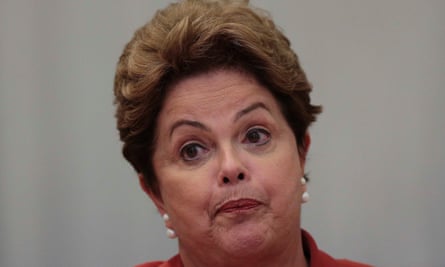
As in the US, pastors are not content with pulpits; they have bought up more than 600 TV and radio channels, including the second-biggest TV company in the country, Rede Record, which is owned by Maçedo.
They are also running for office in record numbers. Evangelical politicians hold 63 of 513 seats in the lower house, having gained 50% more seats in Congress in 2010. This time, they are fielding 45% more candidates.
In the race for the presidency, the leading challenger is Marina Silva, a candidate for the Socialist party and a follower of another of the country’s biggest evangelical groups, the Assembly of God. Polls indicate she will secure a runoff against Rousseff in the first vote on Sunday and is narrowly behind in the second round. If she can come from behind, she would be Brazil’s first evangelical president.
Although Silva’s focus is sustainable development, the influence of her religious affiliation was apparent when she hastily trimmed back a campaign promise to support same-sex marriage after the leader of her church, Silas Malafaia, tweeted his disapproval.
Another candidate is televangelist pastor Everaldo Pereira, who is expected to get only 1% of the vote but has used presidential debates to air his conservative views on abortion and gay rights.
Pedro Strozenberg, researcher at the Institute for Religious Studies in Rio de Janeiro, said evangelicals are increasingly shaping the national debate. “This is the first election where they have a significant presence in the race for president,” he said. “The political progress being made in gay rights and women’s reproductive rights is at risk of being reversed.”
Brazil’s first openly gay congressmen, Jean Wyllys, has warned that Brazil is becoming a theocratic republic as a result of the evangelical movement. “I’m worried they could restrict liberties for ethnic, religious and sexual minorities,” he said.
The evangelicals claim they are more representative of mainstream opinion and that history is on their side.
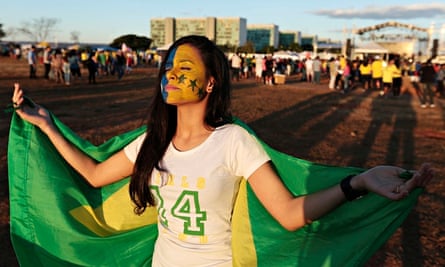
“There are more than 40 million of us in Brazil and we are on course to gain an evangelical majority in the next 25 years. The evangelical vote was decisive in the last election and this one will be no different,” said a spokesman for the Universal Church of the Kingdom of God.
Campaigning from the pulpit is forbidden by Brazilian election law, but outside the church doors preachers are prominently taking sides in the media.
Arguably the most outspoken in Brazil is Malafaia, the multimillionaire head of the Assembly of God, who has declared himself “public enemy No 1 of the gay movement in Brazil”. Although formerly a backer of Workers party (PT) president Luiz Inácio Lula da Silva, Malafaia says he will support anyone who can topple the ruling party.
“It is very important they lose this election. They want total control of the government, the media, they’re showing with their ideology, communist ideology, they want Brazil to turn into Venezuela. They have to lose this election,” Malafaia said.
Several other evangelical churches are also backing Silva. The Fountain of Life apostolic church, which claims 2 million followers, supported Rousseff in the last election, but says it has been disappointed by the president so now backs Silva.
“I am supporting Marina because she’s truly a Christian, she is in line with our beliefs,” the head of the church, Apóstolo César, said.
Like several other pastors, he predicted the evangelical vote will be crucial. “Our influence today is much bigger than it was during the last presidential election four years ago, it’s not just my church, it’s many churches. For me that’s marvellous. People who don’t understand the religion think it’s scary and they think we’re going to take over but we won’t; we want to help and build a better Brazil for future generations.”
With polls so close, any large block of votes will make a difference. But whether the evangelicals will be decisive is still to be seen. Despite the claims of the pastors, polls suggest many believers do not vote solely according to their religion and the churches themselves are often divided and competitive.
However, even if this poll does not prove the political turning point for evangelical Christianity in Brazil, its influence only looks likely to grow.
Additional reporting by Anna Kaiser
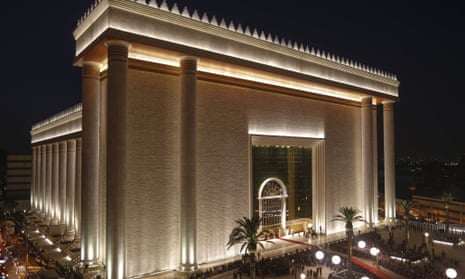


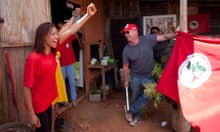
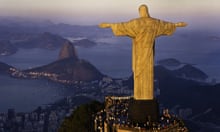
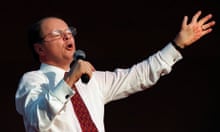
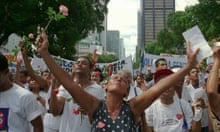
Comments (…)
Sign in or create your Guardian account to join the discussion